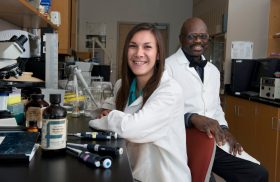A chance encounter during a study abroad program led Emily Tomich ’15 to team up with her mentor to research the effects a Himalayan tree has on starvation recovery.

It was in a small Ghanaian community that Emily Tomich ’15 first spotted the tree. The exercise science and public health studies double major was visiting the country during a study abroad program her sophomore year when she saw a villager marketing Moringa saplings for their health benefits. Tomich, a high jumper at the time for the Elon Phoenix track and field team, noted her observation in a travel journal.
Less than a year later, as she prepared for a Winter Term public health practicum in India, Tomich found that journal entry and pondered a nagging question: Can Moringa not only be used as a supplement, but as a medicinal option to help people recover from starvation? It’s a critical concern. In parts of India, Tomich says, superstitions about the tree keep many people from recognizing its high-impact, low-cost benefits.
Past scientific research relied on simple body measurements to evaluate Moringa’s effects on combating malnourishment. Because nothing existed to show what happens at a molecular level, with mentoring by Associate Professor Matthew Clark in the Department of Biology, Tomich planned a research project involving frogs that she would briefly starve before feeding them crickets infused with Moringa extract.
Though not a biology major, Tomich and Clark had already developed a strong mentoring relationship. The student from Irvine, Calif., had excelled in an anatomy course Clark led and she was soon working for him as a teaching assistant. Clark’s experience dissecting frogs also offered Tomich the knowledge in which to plan and execute her project, which at times required her to rise above budget concerns and laboratory setbacks.
The final results surprised both student and mentor. Not only did the frogs recover from their temporary starvation, the level of the LDH enzyme found in the livers—“bad cholesterol,” a byproduct of starvation—was lower than the frogs in a control group that were never without food. “The Moringa has so many other potential effects on the liver and repairing the body that we hadn’t even considered,” says Tomich, one of more than 200 students who shared their work in April at Elon’s Spring Undergraduate Research Forum.
In undergraduate research, it’s more common to find students who team with professors on projects already underway. The opposite is true with the Moringa project. Clark says Tomich’s research is the foundation of his own new scientific question: Can the Moringa also reverse the effects of food toxins on the nervous system? If the answer is yes, he adds, the implications would be immense. Clark describes Tomich’s work as a public service. “Emily Tomich will make a statement in the realm of global health that will impact the lives of many people,” he says. “That’s the kind of young woman she is, and that is what’s kept me excited about conducting research with her.”
Tomich’s time at Elon is part of a larger legacy she only learned about recently from her grandmother. One of her great-great grandfathers, D.S. Farmer, served on Elon’s Board of Trustees in the early 20th century. Her great grandfather briefly attended Elon, as did four great aunts and uncles, including Esther Emily Farmer ’23. Tomich credits Elon and her undergraduate research project for her commitment to development work and humanitarian aid. Applications to the Peace Corps and the Fulbright program are now being planned as she contemplates future research ideas and a possible career in higher education.
“To get this published would be my dream,” Tomich says. “[This project] is going to be something that affects me and my career for a very long time.”
By Eric Townsend


